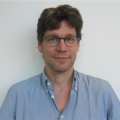Sebastian Bonhoeffer, Ph.D.
Professor of Theoretical Biology, Department of Environmental Systems Science, ETH ZurichSebastian Bonhoeffer’s website
PriME Project: Mathematical Modeling of Metabolism and Assembly in Microbial Communities
Project I: The Role of Trade-Offs in Determining the Distribution of Metabolic Functions over Different Cell Types
Extending earlier work (Pfeiffer et al, PLoS Biol 2005), we will develop a simple ODE-based model framework that describes a network of enzymes and transporters processing metabolites, some of which are involved in biomass formation. Growth rate and fitness are a function of the costs and rates of biomass synthesis. Subjecting this network to in silico evolution through changes of investments in enzyme or transporter expression, we will study how the environment and trade-offs together influence how and whether metabolic functions are contained in a single cell type or are distributed over different cell types. Regarding environment, we consider factors such as the rate of resource influx (i.e., metabolites that are available in the environment), the type of resource and the diversity of resources. Regarding trade-offs, we consider factors such as restriction of the total concentration of enzymes or intermediates, energetic trade-offs such as rate versus yield, and more. We model the growth of cells in a chemostat and iteratively determine optimal flux distributions for a given resource concentration and test whether new metabolic types can invade the resident community. We will complement this work by using a semi-kinetic metabolic model of E. coli, which predicts growth rates under a diverse set of media (Adadi et al, PLoS Comput Biol 2012). The aim is to also perform in silico evolution on this more complex model to test again the circumstances under which cross-feeding would occur.
Project II: Optimal Foraging and the Cost of Metabolic Switching
To make optimal use of resources in the surrounding environment, microbes need not only make decisions when to leave a resource path and search for a new one, but also which resource(s) to take up and metabolize, and they must do this in the context of dynamically changing resource levels. Switching from one resource to another may have costs in terms of the necessary changes in gene expression and protein synthesis to switch between metabolic pathways. We will investigate the extent to which patterns of resource use and switching between resources in microbes can be explained as optimal foraging strategies that maximize fitness. This project is partially based on using explicit models of E. coli metabolism (Bonhoeffer group) and partially on measuring fitness costs under changing resource use in microfluidic devices (Stocker group).
Project III: Modeling the population dynamics on particles
In collaboration with the group of Otto Cordero, which will produce time-resolved measurements of frequency of multiple bacterial species on organic particles, we will develop Lotka-Volterra-type models of interacting populations on a degrading resource. The goals of the models are: (i) the construction of appropriate null models to determine appropriate population dynamical fingerprints of interactions, and (ii) the development of appropriate models to statistically infer parameters of interaction.
Bio:
Trained originally as a physicist, Sebastian Bonhoeffer moved into evolution and population dynamics of microbial organisms and infectious pathogens during his Ph.D. studies in the department of zoology at the University of Oxford. Later, as a junior group leader at the Friedrich Miescher Institute for Biomedical Research and then as an SNF professor at ETH Zürich, he began to work on the evolution of energy metabolism in heterotrophic organisms, discovering a fundamental trade-off in growth rate and yield in heterotrophs. Bringing together his expertise on the mathematical modeling of microbial population dynamics with the evolution of metabolism in microbial communities will be central to the goal of uncovering fundamental organizing principles in microbial communities.